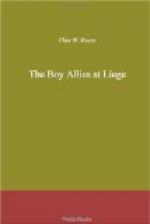“My men are ready to seize the entire Belgian staff, at a moment’s notice, sir.”
The confusion that broke out immediately following his words told Chester that his shot had missed. But the boy stood his ground. There was nothing else he could do.
From the opposite side of the room came a cry:
“That was the work assigned to me.”
“That is not true,” was Chester’s quick reply. “I was the man selected for that work.”
The man on the other side of the room made a spring toward Chester, but he was arrested by the commanding voice of the chief, who now stood up to his full height, a revolver barrel gleaming in his outstretched hand.
“There is a traitor here,” said the chief calmly. “I shall be the one to decide who it is, for you are all known to me. Unmask!”
Every person in the room save Chester obeyed this command, and for the fraction of a second he stood alone, his face still covered. But he stood for a fraction of a second only.
Then with a quick move his revolver leaped from his pocket, and there was the sound of a shot. The chief toppled over to the floor.
Chester leaped to one side, and with a backward sweep of his left arm knocked the single lamp from the wall and plunged the room into darkness.
Then he dropped to his knees. And none too soon, for twenty pistols cracked and as many bullets went hurtling by the spot where he had stood a moment before.
Ten feet behind Chester was a door. He had noticed it when he first entered the room, and had decided that there lay whatever chance he had for safety should he be discovered. Quickly, and still stooping, he ran toward the door.
And even as he reached it a match flared up and a bullet whistled by his ear. But the door was unlocked and gave before the boy’s weight, and as, after passing safely through it, he turned to close it in the faces of his enemies, one man blocked him, his arm raised to fire.
But Chester’s revolver rang out first. The lad had fired from his hip, and the man went sprawling.
The lad turned his weapon on the others who now rushed toward him, and fired three rapid shots. Then he slammed the door shut, bolted it with a single movement, and, turning, ran along the dark passageway, at the end of which he could discern a dim light.
Chester wiped his brow with his hand, and his hand came away wet. Holding it close to his eyes as he ran, Chester saw blood. A bullet had struck him a glancing blow on the side of the head, but in the excitement of the moment he had not realized that he was wounded.
At the end of the passageway the lad emerged into another room. There was not a window in the room, and, glancing hurriedly about, Chester espied a pair of stairs. Quickly he leaped up these, and came into what apparently at one time had been a kitchen.
The boy’s gaze roved hastily about for a means of exit. He tried the door, but it was locked. Twice he threw his whole weight against it, but it did not budge. He looked at the windows. For some reason, they were heavily barred.




